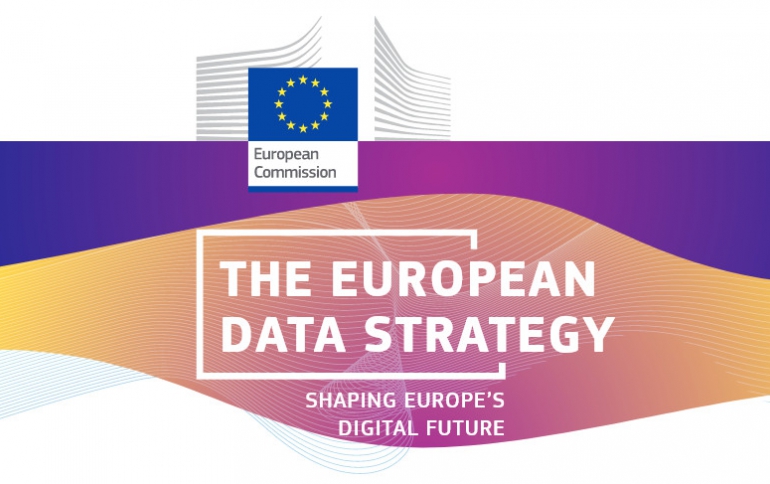
European Commission Outlines Strategies for Data and Artificial Intelligence
Today, the European Commission (EC) unveiled the European data strategy and the policy options to ensure a human-centric development of Artificial Intelligence (AI).
The President of the Commission, Ursula von der Leyen, said: “Today we are presenting our ambition to shape Europe's digital future. It covers everything from cybersecurity to critical infrastructures, digital education to skills, democracy to media. I want that digital Europe reflects the best of Europe – open, fair, diverse, democratic, and confident.”
New policies and frameworks will enable Europe to deploy digital technologies and strengthen its cybersecurity capacities.
In its White Paper presented today, the Commission envisages a framework for trustworthy Artificial Intelligence, based on "excellence and trust." In partnership with the private and the public sector, the aim is to mobilise resources along the entire value chain and to create the right incentives to accelerate deployment of AI, including by smaller and medium-sized enterprises. This includes working with Member States and the research community, to attract and keep talent. "As AI systems can be complex and bear significant risks in certain contexts, building trust is essential. Clear rules need to address high-risk AI systems without putting too much burden on less risky ones. Strict EU rules for consumer protection, to address unfair commercial practices and to protect personal data and privacy, continue to apply," the EC said.
For high-risk cases, such as in health, policing, or transport, the EC says that AI systems should be transparent, traceable and guarantee human oversight.
"Authorities should be able to test and certify the data used by algorithms as they check cosmetics, cars or toys. Unbiased data is needed to train high-risk systems to perform properly, and to ensure respect of fundamental rights, in particular non-discrimination. While today, the use of facial recognition for remote biometric identification is generally prohibited and can only be used in exceptional, duly justified and proportionate cases, subject to safeguards and based of EU or national law, the Commission wants to launch a broad debate about which circumstances, if any, might justify such exceptions."
For lower risk AI applications, the Commission envisages a voluntary labelling scheme if they apply higher standards.
The amount of data generated by businesses and public bodies is constantly growing. The next wave of industrial data will deeply transform the way we produce, consume and live.
The European data strategy aims at setting up a true European data space, a single market for data, to unlock unused data, allowing it to flow freely within the European Union and across sectors for the benefit of businesses, researchers and public administrations. "Citizens, businesses and organizations should be empowered to make better decisions based on insights gleaned from non-personal data. That data should be available to all, whether public or private, start-up or giant," the EC said.
To achieve this, the Commission will first propose to establish the right regulatory framework regarding data governance, access and reuse between businesses, between businesses and government, and within administrations. This entails creating incentives for data sharing, establishing practical, fair and clear rules on data access and use, which comply with European values and rights such as personal data protection, consumer protection and competition rules. It also means to make public sector data more widely available by opening up high-value datasets across the EU and allowing their reuse to innovate on top.
Second, the Commission aims at supporting the development of the technological systems and the next generation of infrastructures, which will enable the EU and all the actors to grasp the opportunities of the data economy. It will contribute to investments in European High Impact projects on European data spaces and trustworthy and energy efficient cloud infrastructures.
Finally, it will launch sectoral specific actions, to build European data spaces in for instance industrial manufacturing, the green deal, mobility or health.
The Commission will also work to further narrow the digital skills gap among Europeans, and explore how to give citizens better control over who can access their machine-generated data.
The Commission will present later this year a Digital Services Act and a European Democracy Action Plan, propose a review of the eIDAS regulation, and strengthen cybersecurity by developing a Joint Cyber Unit.
The White Paper on Artificial Intelligence is now open for public consultation until 19 May 2020. The Commission is also gathering feedback on its data strategy.
The proposed legislation is designed to help Europe compete with the U.S. and China’s technological power while still championing EU rights. The commission is also expected to overhaul rules around legal liability for platforms, like Facebook Inc. and Twitter Inc., later this year.
Facebook Chief Executive Officer Mark Zuckerberg met with EU officials in Brussels on Monday as he called on governments to devise a different system for platforms -- somewhere between newspaper publishers, who can be sued for what journalists write in their pages, and telecommunications companies, who aren’t liable for customer conversations.





















